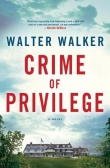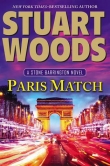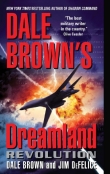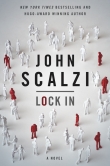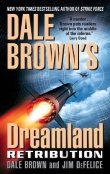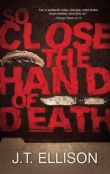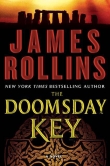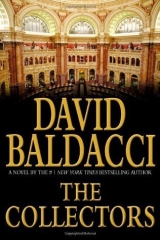
Текст книги "The Collectors"
Автор книги: David Baldacci
сообщить о нарушении
Текущая страница: 3 (всего у книги 27 страниц)
And yet dead Jonathan DeHaven was.
• • •
About twenty–five miles away Roger Seagraves’ phone rang at his home. It was the weather report: sunny and clear for the foreseeable future. Seagraves finished his breakfast, grabbed his briefcase and headed to work. He loved it when the day started on a positive note.
Chapter 6
Caleb Shaw entered the Rare Books reading room and strolled to his desk against the wall at the back, where he deposited his knapsack and bike helmet. He took a moment to undo the strap around his ankle that kept chain grease off his pant leg, and then settled down in his chair. He had a lot to do this morning. The previous day a prominent American scholar had requested over six hundred books to prepare a complex bibliography, and it was Caleb’s job as a research specialist to gather them together. He’d already looked the works up in the library’s directory; now came the laborious task of plucking them off the shelves.
He smoothed down his rumpled gray hair and loosened his belt a bit. Caleb had a slightly built frame, but as of late he’d experienced an uncomfortable weight gain around his waist. He hoped that riding his bike to work would adequately address this problem. He avoided anything approaching a sensible diet, immensely enjoying his wine and rich food. Caleb was also proud of the fact that he’d never seen the inside of a gym after his graduation from high school.
He walked to the vault entrance, placed his card over the security pad and pulled the door open. Caleb was a little surprised not to have seen Jonathan DeHaven when he came in. The man was always here before anyone else, and the door to the reading room had been unlocked. Yet Caleb assumed the director was either in his office or perhaps in the vaults.
“Jonathan?” he called out, but received no answer. He glanced at the list in his hand. This task would easily take him the entire day, if not longer. He grabbed a book cart from against one of the walls and set about his work, methodically going through each of the vaults containing books he needed. A half hour later he came back out of the vault to get another list he needed as a woman he worked with entered the reading room.
He exchanged pleasantries with her and went back into the vault. It was very cool inside, and he remembered that yesterday he’d left his sweater on the vault’s fourth floor. He was about to take the elevator up when he gazed down at his middle–age spread and decided on the stairs instead, actually running up the last few steps. He passed by the medical collection, took another flight of steps up and reached the mezzanine. He strode across the main walkway to the place where he’d left his sweater.
When he saw the body of Jonathan DeHaven lying on the floor, Caleb Shaw gasped once, choked and then fainted.
• • •
The tall, wiry man walked out of the plain cottage and into the small cemetery where he worked as caretaker. There was a lot of work to be done in making sure that the homes of the dead were maintained properly. Ironically, he himself “officially” resided in a grave at Arlington National Cemetery, and most of his former mates in the government would have been surprised to learn that he was still alive. In fact, it still surprised him that he wasn’t dead. The agency where he’d worked had tried its best to murder him for no reason other than his no longer wanting to kill for his government.
He saw the creature’s movement from the corner of his eye and checked to make sure no one was watching from the nearby apartment building. Then with a fluid motion he slipped the knife from the sheath on his belt and turned. Creeping forward, he aimed and let the blade fly. He watched as the copperhead writhed, the knife pinning it to the ground through the snake’s head. The damn thing had almost bitten him twice over the last week while hiding in the high grass. After it was dead, he pulled the knife free, wiped it off and disposed of the serpent in a trash can.
While he didn’t often use his old skills, they sometimes came in handy. Thankfully, though, the days where he would lie in wait for a target to enter his killing range were long in the past. Yet his present life had certainly been impacted by the past, starting with his name.
He had not used his real identity, John Carr, in over thirty years. He’d been known for decades now as Oliver Stone. He had changed his name partly to foil attempts by his old agency to track him down and partly as an act of defiance against a government that he felt was less than honest with its citizens. For decades he’d maintained a small tent in Lafayette Park across from the White House where he was one of a handful of “permanent protesters.” The sign next to his tent read simply “I want the truth.” In pursuit of this goal he headed up a small, informal watchdog organization called the Camel Club that had as its purpose keeping the American government accountable to its people. And he had been known to harbor a few conspiracy theories from time to time.
The other members of the club, Milton Farb, Reuben Rhodes and Caleb Shaw, held no positions of power and wielded no influence; and yet they kept their eyes and ears open. It was remarkable what could be accomplished when one was steadfastly observant and then acted on those observations with both courage and ingenuity.
He gazed at the sky that promised rain later. A wind from an approaching front rustled his close–cropped white hair, which used to be down to his shoulders, along with a thick, disheveled beard that had once covered his chest. Now the most he sported was a couple days’ worth of growth before shaving it off. Both hair and beard had been altered to keep him alive during the Camel Club’s last adventure.
Stone threw some weeds into a garbage pail and then spent some time shoring up an old tombstone that marked the resting place of a prominent African American preacher who’d lost his life in the fight for freedom. Odd, thought Stone, that one had to fight for freedom in the freest land on earth. As he gazed around Mt. Zion Cemetery, once a stop on the underground railroad shepherding slaves to freedom, he could only marvel at the remarkable persons that lay in the ground here.
As he worked, he was listening to the news on a portable radio he’d set on the ground beside him. The news anchor had just launched into a story about the overseas deaths of four State Department liaisons in Iraq, India and Pakistan in separate incidents.
State Department liaisons? Stone knew what that meant. U.S. intelligence operatives had gotten their cover blown and been murdered. The official spin would hide that fact from the public; it always did. Yet Stone prided himself on keeping on top of current geopolitical events. As part of his salary the church that employed him provided three daily newspapers. He cut out many articles and pasted them in his journals. At the same time, he used his experience to discern the truth behind the spin.
His ringing cell phone disturbed these thoughts. He answered, listened briefly and asked no questions. Then he started to run. His friend and fellow Camel Club member Caleb Shaw was in the hospital, and another man who worked at the Library of Congress lay dead. In his haste Stone forgot to lock the gates as he rushed through them.
The dead would have no doubt understood that the living took priority.
Chapter 7
Caleb Shaw lay in a hospital bed slowly shaking his head. Around him were the other members of the Camel Club. Reuben Rhodes was nearly sixty years old, over six foot four with the build of a football lineman. He had curly black hair that touched his shoulders and brooding eyes and an unkempt beard that made him appear quite mad at times; which, on occasion, was nearer the truth than not. Milton Farb was five–eleven and thin with longish hair and a cherubic, unlined face that made him look much younger than his forty–nine years.
Reuben was a much–decorated Vietnam War vet and former Defense Intelligence Agency employee, who currently worked at a loading dock after his military career had been derailed by booze, pills and his outrage over the war that he’d indiscreetly vented. He dried out with the help of Oliver Stone, who’d happened upon him at Arlington National Cemetery where Reuben had been unceremoniously lying stoned under a maple tree.
Milton had been a child prodigy of boundless intellectual ability. His parents had worked in a traveling carnival where their son’s mental prowess was exploited in a freak show atmosphere. Despite that, he had gone to college and been employed at the National Institutes of Health. However, suffering from obsessive–compulsive disorder and other destructive mental ailments, his world had eventually come crashing down around him. He became destitute and fell into such debilitated mental shape that a court ordered him institutionalized.
Again Oliver Stone came to the rescue. He’d worked as an orderly at the psychiatric hospital where Milton had been a patient. Recognizing the man’s remarkable abilities, which included a pure photographic memory, Stone managed to get a sedated Milton on Jeopardy! where he defeated all comers and earned a small fortune. Years of dedicated counseling and drug therapies had allowed him to live quite normally. He now had a lucrative business designing Web sites for corporations.
Stone leaned his six–foot–two–inch body against a wall, his arms crossed in front of him as he looked down at his friend in the bed.
Possessing twin doctorates in political science and eighteenth–century literature, Caleb Shaw had worked at the Library of Congress’ Rare Books reading room for over a decade. Unmarried and childless, the library, aside from his friends, constituted the passion of his life.
Caleb had run into some hard times as well. He’d lost an older brother in Vietnam, and his parents had died tragically in a plane crash over fifteen years ago. Stone had met Caleb at the depths of his despair, when the librarian had seemingly lost his desire to keep going. Stone befriended him, introduced him to a bookstore owner in desperate need of help, and Caleb was gradually drawn out of his depression by his love of books. I seem to collect hopeless cases, Stone thought to himself. Though I used to be one myself. Indeed, Stone owed as much to his friends as they did to him, if not more. But for Caleb, Reuben and Milton, Stone knew, he wouldn’t have survived either. After years of performing only destructive acts, Stone had spent the last thirty years of his life seeking a measure of personal redemption. By his count, he still had a long way to go.
Stone’s musings were interrupted by the entrance of Alex Ford, a veteran Secret Service agent who’d played an instrumental role in helping the Camel Club in the past and been named an honorary member of the club for his heroics.
Ford stayed for half an hour and was relieved to find that Caleb would be okay.
He said, “Take care of yourself, Caleb. And call me if you need anything.”
“How are things at WFO?” Stone asked him, referring to the Service’s Washington Field Office.
“Way too busy. The criminal elements have kicked it into overdrive.”
“Well, I hope you’ve recovered fully from our little adventure.”
“I don’t call a potential global apocalypse a little adventure. And I don’t think I’ll ever fully recover.”
After Alex Ford had left, Caleb turned to the others. “It was truly horrible,” he said. “There he was just lying on the floor.”
“And you fainted?” Stone asked, his gaze fixed on his friend.
“I must have. I remember turning the corner, looking for my sweater, and there he was. God, I almost stumbled over him. I saw his eyes. My mind went blank. My chest tightened. I felt so cold. I thought I was having a heart attack. And then I just passed out.”
Reuben put a hand on Caleb’s shoulder. “A lot of people would’ve fainted.”
Milton piped in, “The National Psychiatric Foundation reports that finding a dead body ranks as the second most traumatic event a human being can experience.”
Reuben raised his eyebrows at this comment. He said, “What’s the number one traumatic experience? Finding your spouse in bed with a monkey holding a can of expired Cheez Whiz?”
“Did you know DeHaven well?” Stone asked Caleb.
“Yes. It’s tragic, really. He was in excellent shape. He’d just had a complete cardio workup at Hopkins. But I guess anyone can have a heart attack.”
“Is that what it was, a heart attack?” Stone said.
Caleb looked uncertain. “What else could it be? Or a stroke perhaps?”
“Statistically speaking, it was probably a heart attack,” Milton added. “It’s the leading cause of so–called instant death in this country. In fact, any of us could drop at any moment and be dead before we hit the floor.”
“Damn, Milton,” Reuben retorted, “do you have to be so bloody cheerful?”
“Until the autopsy results come back we can only speculate,” Stone pointed out. “But you didn’t see anyone else in the vault area, did you?”
Caleb stared up at his friend. “No.”
“But you passed out pretty quickly, so you wouldn’t have necessarily noticed anyone else around on the fourth floor?”
“Oliver, you can’t get in the vault without using your pass card. And there’s a camera right there at the main door.”
Stone looked thoughtful. “First, the Speaker of the House is murdered, and now the director of the Rare Books Division dies under somewhat mysterious circumstances.”
Reuben eyed him warily. “I doubt terrorists are targeting book peddlers these days, so don’t work this into another grand conspiracy with the fate of the world in the balance. I can only take one Armageddon per month, thank you very much.”
Stone’s eyes twinkled. “We’ll table the issue for now until we know more.”
“I can give you a ride home, Caleb,” Reuben said. “I have my motorcycle.”
Reuben’s pride was his fully restored 1928 Indian motorcycle with the very rare left–hand sidecar.
“I don’t think I’m up to that, Reuben.” Caleb paused and added, “Frankly, that contraption of yours terrifies me.”
A nurse bustled in, took the patient’s vitals and stuck a temperature reader in Caleb’s left ear.
“Can I go home soon?” he asked.
She took the reader out and looked at it. “You’re almost up to normal. And yes, I think the doctor is preparing the discharge orders now.”
As arrangements were made for Caleb’s release, Stone drew Reuben aside.
“Let’s keep an eye on Caleb for a while.”
“Why? You think he’s really hurt?”
“I don’t want him to get hurt.”
“The guy died from a coronary, Oliver. It happens every day.”
“But probably not for someone who’d just been given a clean bill of health by Johns Hopkins.”
“Okay, so he popped a blood vessel or fell and cracked his skull. You heard Caleb: The guy was all alone in there.”
“As far as Caleb knows, he was, but he couldn’t possibly know for sure.”
“But the security camera and the pass card,” Reuben protested.
“All good points, and they may very well confirm that Jonathan DeHaven was alone when he died. But that still doesn’t prove he wasn’t killed.”
“Come on, who’d have a grudge against a librarian?” Reuben asked.
“Everyone has enemies. The only difference is for some people you just have to look harder to find them.”
Chapter 8
“How’s it check out?” Leo Richter said into his phone headset as he punched in some numbers on the keypad. He sat in his car in front of a drive–through ATM in Beverly Hills. In a van parked across the street Tony Wallace, until recently a felonious boutique store clerk, examined the video feed on the screen in front of him. “Sweet. I’ve got a perfect frame of your fingers inputting the PIN. And I’ve got a tight shot of the face of the card going in. With the zoom and the freeze I can read everything on it.”
The night before, they had switched the metal box containing bank brochures that was bolted to the side of the ATM with a box of Tony’s manufacture. He’d earlier stolen a box from another ATM and built an exact replica in the garage of the rental house Annabelle had them staying at. Inside the fake brochure box, Tony had placed a battery–powered video camera with wireless feed pointed at the keypad and card slot for the ATM. The camera could send the picture up to two hundred meters away, well within range of the van.
As a backup they’d also placed a skimmer Tony had built over the ATM’s card slot. It was such a perfect replica that not even Annabelle could find fault with it. This device captured all the numbers on the cards, including the embedded verification code on the magnetic stripe, and fed them wirelessly to a receiver in the van.
Annabelle was sitting next to Tony. Across from her was Freddy Driscoll, who’d been plying his trade selling fake Gucci and Rolexes on the Santa Monica pier until he’d run into Annabelle and Leo. Freddy was manning another video camera aimed out the heavily tinted side window of the van.
“I’ve got a clear shot of the cars and license plates going through,” he reported.
“Okay, Leo,” Annabelle said into her headset. “Move out of the way and let the real money through.”
“You know,” Tony said, “we don’t really need the camera at the ATM because we’ve got the card skimmer. It’s redundant.”
“Transmission from the skimmer gets garbled sometimes,” Annabelle said, staring at the TV screen in front of her. “And you miss one number, the card’s useless. Plus, the camera gives us info the skimmer doesn’t. We’re only doing this once. No mistakes.”
Over the next two days they sat in the van as the ATM camera and skimmer captured debit and credit card information. Annabelle methodically matched this information with the cars and their license plates going through the ATM lane, loading it all on a laptop in a spreadsheet format. Annabelle was also prioritizing.
She said, “Bugatti Veyrons, Saleens, Paganis, Koenigseggs, Maybachs, Porsche Carrera GTs and Mercedes SLR McLarens get five stars. The Bugatti sells for one and a quarter million, and the others sell for between four and seven hundred thousand. Rolls–Royces, Bentleys and Aston Martins get four stars. Jags, BMWs, regular Mercedes get three stars.”
Leo jokingly said, “What about Saturns, Kias and Yugos?”
At the end of the two days they regrouped at the rental house.
“We go quality over quantity,” Annabelle said. “Thirty cards. That’s all we need.”
Leo read through the spreadsheet. “Perfect, because we’ve got twenty–one five stars and nine four stars all matched to their card numbers.”
“Only in L.A. would you see two Bugatti Veyrons going through the same ATM,” Tony commented. “A thousand horsepower, top speed of two–fifty and gas over three bucks a gallon. I mean, where do they get that kind of money?”
“Same way we do, they rip people off,” Leo answered. “Only the law says the way they do it is legal for some reason.”
“I fought the law and the law won,” Tony crooned. He eyed Annabelle and Leo. “You two ever done any time?”
Leo started shuffling a deck of cards. “He’s a real funny guy, isn’t he?”
“Hey, how come you took down their license plate numbers too?” Tony asked.
“You never know when it might come in handy,” Annabelle answered vaguely.
She looked at Freddy, who was going over some equipment he’d arranged on a large table in the adjoining room. This included a stack of blank credit cards and a thermal dye printer.
“You have everything you need?” she asked.
He nodded, looking over his tools with satisfaction while running a hand through his cottony hair. “Annabelle, you run a first–class operation.”
Three days later Freddy had built thirty counterfeit cards, complete with colored graphics and a magnetic stripe encoded with the verification code on the back and embossed with the victim’s name and account number on the front. The finishing touch had been the hologram, a security measure banks have been using since the early 1980s. The only way to tell the difference was that real holograms are embedded in the card while the fake clung to the surface, something an ATM wouldn’t be able to distinguish.
“You can buy all the credit card numbers you want off the Internet,” Tony pointed out. “That’s where the real pros go.”
Annabelle replied, “And I guarantee you that none of those ‘quick’ cards belong to anyone who owns a Bugatti, other than by luck.”
Leo quit shuffling his cards and lit a cigarette. “It was probably a pro who told you that, kid, so you wouldn’t start doing it the smart way and competing with him. Sizing the mark up right is Con 101.”
Tony said, “Damn! Have I been that stupid?”
“Yes, you have,” Annabelle said. “Okay, here’s the plan.” She perched on the arm of a chair. “I’ve rented cars for all of us under fake ID packs. The three of you each take eight cards, and I’ll take six, which makes our total thirty cards. You’ll individually hit forty ATMs in the metro area and perform two transactions at each. You’ll alternate the cards you use at every ATM, so at the end you’ll have accessed each account ten times.”
“I’ve got lists of all the ATMs. And I’ve plotted it out for each of you. They’re all drive–through, and there’s hardly any distance between them. And we’re all in disguise because of the ATM cameras. I’ve got outfits for everybody.”
“But there’re limits on how much you can take out of an account in a day,” Freddy said. “To protect against stolen cards.”
Annabelle said, “With the marks we’re going against, it’s a certainty they have elevated withdrawal limits. People who drive seven–hundred–thousand–dollar cars don’t like three–hundred–dollar limits on their ATM accounts. My contacts on the bank side tell me the usual initial bump–up is to twenty–five hundred. But aside from that, the counterfeit cards give us access to all of the mark’s accounts, savings, checking. If we make a deposit from savings into checking to more than cover the amount of the withdrawal, then in the machine’s mind that’ll net out as a plus and override the ATM withdrawal limit, whatever it happens to be.”
“So if we deposit, say, five thousand from savings into checking and withdraw four thousand, it won’t even register as a net withdrawal from checking,” Leo added.
“Yes.”
“Are you sure?” Tony asked.
“I did a dry run last month with ten of the major banks, and it worked every time. It’s a software glitch they haven’t focused on yet. Until they do, well, it’s a nice payday.”
Leo smiled and started shuffling his cards again. “After this gig, you can bet they’ll focus on it.”
“Why not do eight transactions at each ATM, one for each card?” Tony suggested. “That way we don’t have to hit so many banks.”
“Because it might look a little suspicious if you’re feeding eight cards into the slot while people are waiting behind you,” Annabelle said in an impatient tone. “With two cards, it just looks like there was a glitch and you’re feeding the card back in.”
“Ah, the criminal youth, so wanton and clueless,” Leo muttered.
She handed them all three–ring notebooks. “Inside these are the PINs for each card, and the exact amounts at each ATM you’ll transfer for deposit and then withdraw for each account. After we finish, the notebooks get burned.” She rose, went to a closet and threw them duffel bags. “Your disguises are in there, and then use the bags to carry the money.” She sat back down. “I’ve allowed you ten minutes at each bank. We stay in contact with each other at all times. If anything looks weird at one location, skip it and go on to the next one.”
Freddy looked at the dollar amounts listed in his notebook. “But what if the people don’t have the funds to cover the deposit? I mean, even rich people are sometimes short of funds.”
“They have the cash. I’ve already checked that,” Annabelle said.
“How?” Tony asked.
“I called their bank, said I was a vendor and asked if they had enough money in their savings to cover a fifty–thousand–dollar account payable that they owed.”
“And they just told you?” Tony said.
“They always tell you, kid,” Leo answered. “You just have to know how to ask.”
Annabelle said, “And over the last two days I’ve visited all the marks’ homes. Each one, to my eye, was worth at least five million. There were two Saleens at one of the mansions. The dollars will be there.”
“You visited their homes?” Tony said.
“Like the lady told you, license plates come in handy,” Leo remarked.
“The total take will be nine hundred thousand, an average of thirty grand a card,” Annabelle continued. “The banks we’re hitting all net out their ATM accounts on twelve–a.m. cycles. We’ll be finished long before that happens.” She looked over at Tony. “And just in case someone gets the urge to cut and run, the next short con is going to double what we make off this one.”
“Hey,” Tony said in an offended tone, pushing a hand through his styled hair. “This is fun stuff.”
“It’s only fun if you don’t get caught,” Annabelle pointed out.
“So have you ever been caught?” Tony asked again.
In response, Annabelle said to Tony, “Why don’t you read over your binder? That way you make no mistakes.”
“It’s just ATM stuff. I’ll be okay.”
“It wasn’t a request,” she said stiffly, and then walked out of the room.
“You heard her, kid,” Leo said, not trying very hard to hide his grin.
Tony muttered something under his breath and stalked out of the room.
“She keeps things close to the vest, doesn’t she?” Freddy remarked.
“Would you want to work with a con who didn’t?” Leo countered.
“Who is she?”
“Annabelle,” Leo answered.
“I know that, but what’s her last name? I’m surprised I haven’t crossed her path before. The high–stakes con world is pretty small.”
“If she’d wanted you to know, she would’ve told you herself.”
Freddy said, “Come on, Leo, you know all about us. And I’ve been around the block. It goes no further.”
Leo considered this and then in a low voice said, “Okay, you gotta swear to take it to your grave. And if you tell her I told, I’ll deny it and then I’ll kill you. I mean it.” He paused as Freddy promised.
“Her name’s Annabelle Conroy,” Leo said.
“Paddy Conroy?” Freddy said at once. “Now, him I’ve heard of. I assume they’re related.”
Leo nodded, keeping his voice low. “His daughter. But that was a well–kept secret. Most people never knew Paddy even had a kid. He passed Annabelle off as his wife sometimes. Pretty weird, but that was Paddy for you.”
“I never had the pleasure of working with the man,” Freddy added.
“Yeah, well, I had the pleasure of working with ol’ Paddy Conroy. He was one of the best cons of his generation. And also one of the biggest assholes.” Leo glanced in the direction that Annabelle and Tony had left the room, and his voice sank even lower. “You saw that scar under her right eye? Well, her old man did that. She got that for blowing a claim con when they were cheating the Vegas casinos at roulette. She was all of fifteen but looked twenty–one. Cost the old man three grand, and she got a hell of a beating for it. And it wasn’t the only time, I can tell you that.”
“Damn,” Freddy said. “His own daughter?”
Leo nodded. “Annabelle never talks about any of it. I heard from another source.”
“So you were working with them back then?”
“Oh, yeah, Paddy and his wife, Tammy. They had some good stuff going on back then. Paddy taught me the three–card monte routine. Only Annabelle’s a better con than her old man ever thought of being.”
“How come?” Freddy asked.
“Because she has the one quality Paddy never had. Fairness. She got it from her mother. Tammy Conroy was a straight–up piece of work, at least for a con.”
“Fairness? Strange quality for people like us,” Freddy remarked.
Leo said, “Paddy always led his teams with fear. His daughter does it with prep and competence. And she’ll never ever screw you. I can’t count the times Paddy blew town with the entire haul. That’s why he ended up working alone. Nobody would touch his action anymore. Hell, even Tammy finally ditched him, so I heard.”
Freddy remained silent for a bit, apparently letting all this sink in. “Any word on the long con?”
Leo shook his head. “It’s her game to call. I just work here.”
As Freddy and Leo headed into the kitchen to get some coffee, Tony peered around the other doorway. He’d left his notebook in the room and had come back in time to hear the entire conversation. He smiled. Tony loved knowing things people didn’t think he knew.
